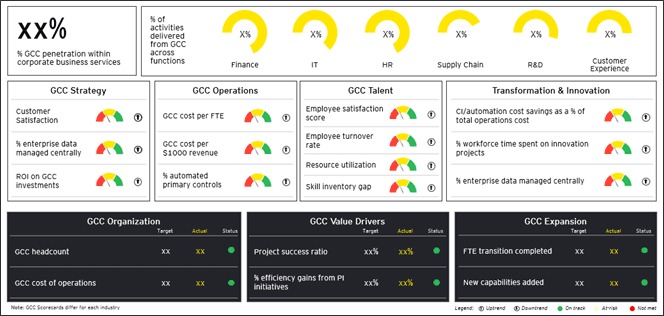
As GCCs evolve, rethinking the strategy for performance improvement can maximize the value derived.
In brief
High performing GCCs go beyond cost and operational excellence; they constantly strive for performance improvement and delivering value across the entire enterprise
GCCs can achieve this by adopting a culture of continuous improvement, focusing on improvements in efficiency, effectiveness, and experience
o
Measuring, reporting, and improving on the value delivered
Performance improvement is an ongoing journey which requires GCC heads to continually track and demonstrate success. Scorecards can serve as powerful tools for GCC heads to visually represent value outcomes.
An ideal scorecard enables an integrated view of value realized, across the elements of strategy, operational excellence, talent, and innovation. Unified scorecard representations will enable GCC heads to systematically analyze trends, identify improvement areas, showcase success, and set leading performance targets. Based on our experience with cross-industry GCCs, below is an illustrative scorecard for a 360° view of GCC performance

How organizations have improved their GCC performance
Wizkid has played a pivotal role in enabling multiple organizations to adopt a structured approach to utilize innovative practices in their GCC operations. This approach includes consolidation, optimization, standardization, and transformation to deliver long-term value. Here are a few recent examples:
A global fashion retail brand wanted to transform its GCC operations. Wizkid helped the retail brand adopt a structured approach, leveraging deviation scores. Due to this, the brand achieved 25% FTE savings through automation, process standardization, and centralization of operations.
A multinational Alco-Bev major delivered GCC performance excellence, including standardization, and automation implementation for 150+ improvements across nine business towers and seven regions enabling, 100+ FTE savings over a period of one year.
A leading oil and gas company transformed its GCC operations through implementation of innovative practices, standardized, and automated process flow models for business services support across multiple countries and 2000+ FTEs. This resulted in the company achieving ~60% efficiency and ~85% accuracy gains.
Summary
GCCs have the potential to achieve incremental efficiencies and optimize the value derived from their operations by embracing a culture of continuous performance improvement. This can be achieved through the implementation of a structured approach to deliver transformations at scale.


